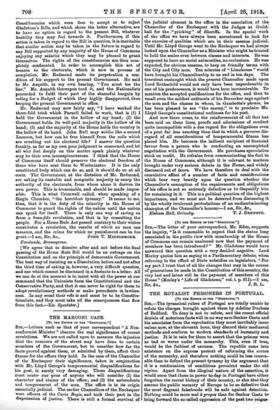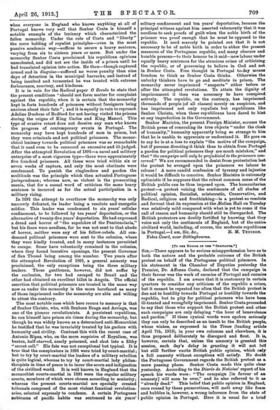THE ROYALIST PRISONERS IN PORTUGAL.
[To THE EDITOR OF TER "SPECTATOR."]
Slit,—The tyrannical rulers of Portugal are totally unable to refute the charges brought against them by Adeline Duchess of Bedford. To deny is not to refute, and the recent official denials of notorious facts will in no way save Senhor Costa and his associates from the reprobation they must inevitably incur unless now, at the eleventh hour, they discard their mediaeval methods and conform to modern standards of humanity and justice. It is in vain for them to assert that the prisons were as bad or worse under the monarchy. This, even if true, would be the feeblest of excuses. The republic came into existence on the express pretext of reforming the errors of the monarchy, and therefore nothing could be less reason- able than to defend the present tyranny by the argument that it is a continuation of conditions prevalent under the old rZyime. Apart from the illogical nature of the assertion, it would seem that those in power to-day in Portugal have either forgotten the recent history of their country, or else that they assume the public memory of Europe to be so defective that the most flagrant falsehoods will be safe against detection. Nothing could be more mal apropos than for Senhor Costa to bring forward the so-called oppression of the past two reignp-
when everyone in England who knows anything at all of Portugal knows very well that Senhor Costa is himself a notable example of the leniency which characterized the fallen monarchy. Under the rule of Costa and "liberty" the mere holding of royalist principles—even in the most passive academic way—suffices to secure a heavy sentence, varying from six to sixteen years or more. But under the monarchy Senhor Costa proclaimed his republican opinions unmolested, and did not see the inside of a prison until he had translated opinion into action. He then—though captured armed and in disguise—suffered no worse penalty than nine days of detention in the municipal barracks, and instead of being insulted and tormented he was treated with extreme forbearance, courtesy, and kindness.
It is in vain for the Radical paper 0 Seculo to state that the present conditions "should not form matter for complaint against the republic, when it is certain that the monarchy kept in forts hundreds of prisoners without foreigners being anxious about their fate "; and it is equally in vain to reproach Adeline Duchess of Bedford for not having visited the prisons during the reigns of King Carlos and King Manoel. This type of evasive retort does not deceive any man who knows the progress of contemporary events in Portugal. The monarchy may have kept hundreds of men in prison, but they were criminals and not political prisoners. The monar- chical leniency towards political prisoners was so remarkable that it used even to be censored as excessive and ill-judged. After the attempted Revolution of 1891—a naval and military enterprise of a most vigorous type—there were approximately five hundred prisoners. All these were tried within six or seven weeks of capture, and only the most obstinate were condemned. To punish the ringleaders and pardon the multitude was the principle which then actuated Portuguese jurisprudence ; whereas now, so violent is the prosecuting mania, that for a casual word of criticism the same heavy sentence is incurred as for the actual participation in a military rising.
In 1891 the attempt to overthrow the monarchy was only narrowly defeated, its leader being a resolute and energetic soldier. This leader was condemned to six years' cellular confinement, to be followed by ten years' deportation, or the alternative of twenty-five years' deportation. He had expressed a dread and horror of "the sepulchre of the Penitenciaria," but his fears were needless, for he was not sent to that abode of horror, neither were any of his fellow-rebels. All con- demned political prisoners were sent to the colonies, where they were kindly treated, and in many instances permitted to escape. Some have voluntarily remained in the colonies, where they found lucrative openings, the present Governor of San Thome being among the number. Two years after the attempted Revolution of 1891, a general amnesty was proclaimed, the only exceptions being the three military leaders. These gentlemen, however, did not suffer by the exclusion, for two had escaped to Brazil and the other had obtained an excellent billet in Angola. The official assertion that political prisoners are treated in the same way now as under the monarchy is the more barefaced as many of those imprisoned under the monarchy are able and willing to attest the contrary.
The most notable case which here recurs to memory is that of Senhor Christ°, who, with Senbors Braga and Arriaga, was one of the pioneer revolutionists. A persistent republican, he ran himself into prison six times during the monarchy, but though he was widely known as a determined anti-Monarchist he testified that he was invariably treated by his gaolers with humanity and civility. Contrast this with the recent case of Antonio Ripas, who, on the mere suspicion of Royalism, was beaten, half-starved, nearly poisoned, and shut into a filthy "secret cell." His fate was not exceptional but typical. It is true that the conspirators in 1891 were tried by court-martial; but to try by court-martial the leaders of a military rebellion is quite logical, whereas to try by court-martial lady philan- thropists in time of peace is to incur the scorn and indignation of the civilized world. It is well known in England that the monarchist courts-martial in 1891 were the regular military courts, members of which were chosen according to seniority; whereas the present courts-martial are specially created tribunals composed of the most violent fanatical revolution- aries, selected expressly to condemn. A certain Portuguese nobleman of pacific habits was sentenced to six years' solitary confinement and ten years' deportation, because the principal witness against him asserted vehemently that it was needless to seek proofs of guilt when the noble birth of the prisoner was proof enough that he must he opposed to the republic. It need scarcely be pointed out that it is not necessary to be of noble birth in order to abhor the present measures of the Portuguese republic, and many obscure and humble persons—to their honour be it said—now labour under equally heavy sentences for the atrocious crime of criticizing the republic, or of presuming to believe in God and not in Senhor Costa. Free thought in Portugal to-day means freedom to think as Senhor Costa thinks. Otherwise the unlucky thinkers have to go and meditate in prison. The monarchy never imprisoned " suspects " either before or after the attempted revolutions. To attain the dignity of imprisonment it then was necessary to have conspired actively. The republic, on the contrary, has imprisoned thousands of people (of all classes) merely on suspicion, and has imprisoned not only royalists but republicans like Senhor Christ°, when those republicans have dared to hint at any imperfection in the Government.
Senhor Macieira, the present Foreign Minister, accuses the British press of concealing its true objects "under the cloak of humanity," humanity apparently being so strange to him that he is unable to appreciate or understand it. He goes on to say he is at a loss to explain "the motive of the campaign, but if persons directing it think thus to obtain from Portugal a pardon for political prisoners they are much mistaken," and that" the campaign will only be prejudicial to the prisoners con- cerned." We are recommended to desist from protestation lest the protest be avenged upon the prisoners we labour to release l A more candid confession of tyranny and injustice it would be difficult to conceive. Senhor Macieira is extremely optimistic if he supposes that the robust common sense of the British public can be thus imposed upon. The humanitarian protest—a protest voicing the sentiments of all shades of political opinion, Socialist, aristocratic, Conservative, and Radical, religious and freethinking—is a protest so resolute and fervent that its expression at the 2Eolian Hall on Tuesday was relatively mild compared with what is yet to come if the call of reason and humanity should still be disregarded. The British protestors are doubly fortified by knowing that they voice not only the sentiments of England, but of the entire civilized world, including, of course, the moderate republicans



























































 Previous page
Previous page